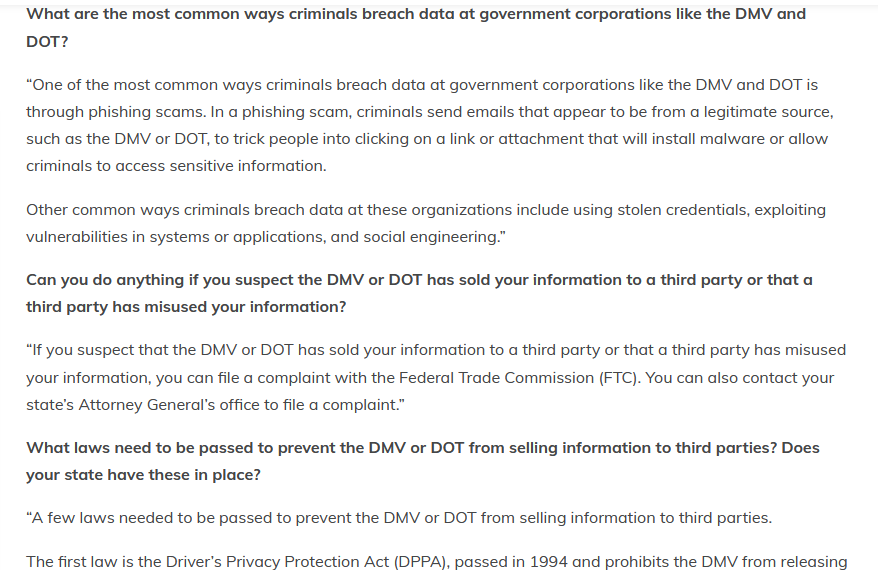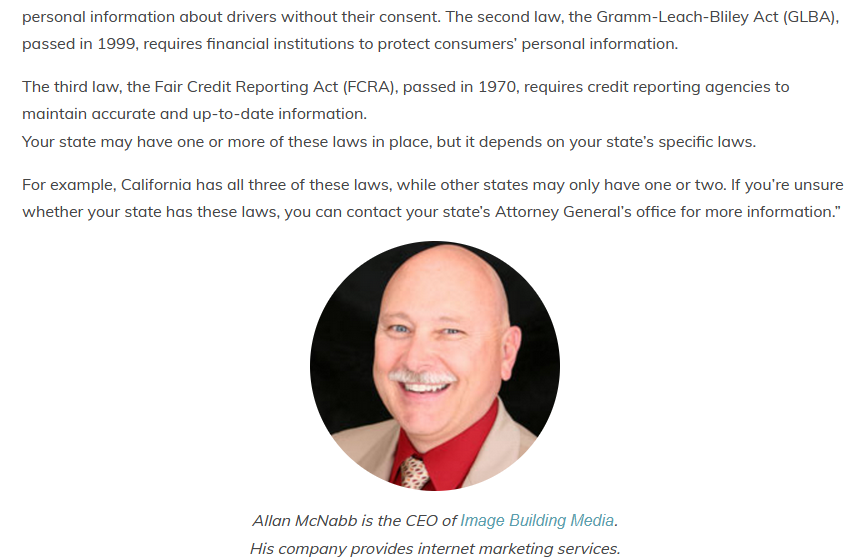Over the last 15 years, data breaches at DMV and DOT locations have affected 235,207 people. While DMV and DOT breaches are not common, they expose sensitive information such as SSNs, birth certificates, home addresses, and more. Allan McNabb of Image Building Media was featured in the recent article by AutoInsurance.org, 10 Worst States for DMV and DOT Data Breaches (2022 Study), discussing the worst states for DMV and DOT data breaches and attacks.
Allan McNabb contributed to the article by giving his thoughts on DMV and DOT breaches, what laws should be passed to prevent breaches and attacks, and what to do if you suspect your information has been stolen or misused. The article featured Allan McNabb with Image Building Media, answering several questions:
What are the most common ways criminals breach data at government corporations like the DMV and DOT?
“One of the most common ways criminals breach data at government corporations like the DMV and DOT is through phishing scams. In a phishing scam, criminals send emails that appear to be from a legitimate source, such as the DMV or DOT, to trick people into clicking on a link or attachment that will install malware or allow criminals to access sensitive information.
Other common ways criminals breach data at these organizations include using stolen credentials, exploiting vulnerabilities in systems or applications, and social engineering.”
Can you do anything if you suspect the DMV or DOT has sold your information to a third party or that a third party has misused your information?
“If you suspect that the DMV or DOT has sold your information to a third party or that a third party has misused your information, you can file a complaint with the Federal Trade Commission (FTC). You can also contact your state’s Attorney General’s office to file a complaint.”
What laws need to be passed to prevent the DMV or DOT from selling information to third parties? Does your state have these in place?
“A few laws needed to be passed to prevent the DMV or DOT from selling information to third parties.
The first law is the Driver’s Privacy Protection Act (DPPA), passed in 1994 and prohibits the DMV from releasing personal information about drivers without their consent. The second law, the Gramm-Leach-Bliley Act (GLBA), passed in 1999, requires financial institutions to protect consumers’ personal information.
The third law, the Fair Credit Reporting Act (FCRA), passed in 1970, requires credit reporting agencies to maintain accurate and up-to-date information.
Your state may have one or more of these laws in place, but it depends on your state’s specific laws.
For example, California has all three of these laws, while other states may only have one or two. If you’re unsure whether your state has these laws, you can contact your state’s Attorney General’s office for more information.”


Image Building Media
Image Building Media is an internet marketing company based in Tampa, Florida, serving businesses throughout the U.S. Internet marketing services by Image Building Media include:
- Automated Marketing
- SEO
- Local SEO
- Social Media Marketing
- Website Design
- Website Management
- Content Marketing
- Video Marketing
- Email Marketing
- SMS Marketing
- Paid Search
- Pay-Per-Click (PPC)
- Display Advertising
- Mobile Web Marketing
- Mobile Apps
- Online Reputation Management
- Conversion Analytics
- CRM Integration and Management
- EHR Integration, Online Scheduling, Patient Portal
- ADA Compliance
- HIPAA Compliance
- Consulting Services
Schedule your free consultation today to discuss your online marketing needs.
